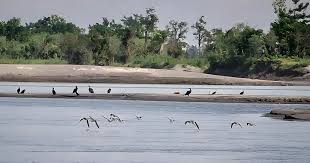Debate Over Oil Exploration in Dibru Saikhowa National Park Intensifies
Current Affairs NationalPosted by newadmin on 2025-02-10 08:46:59 |
Share: Facebook | Twitter | Whatsapp | Linkedin Visits: 24

The controversy over oil exploration in Assam’s Dibru Saikhowa National Park has intensified following the denial of permission for extraction activities. Oil India Limited (OIL) had sought approval to conduct research and development (R&D) studies using Extended Reach Drilling (ERD) technology. Despite previous rejections due to environmental concerns, the Environment Ministry’s Forest Advisory Committee (FAC) has now recommended the R&D proposal under strict conditions.
Extended Reach Drilling (ERD) is an advanced technique that allows drilling at significant depths without disturbing the surface. This method enables horizontal drilling up to 3,500 to 4,000 metres underground, minimizing direct impact on protected areas. OIL proposed the use of ERD to assess its environmental impact without engaging in direct oil extraction.
The R&D initiative follows the FAC’s earlier rejection of a proposal to drill seven oil wells within the national park. The primary reasons for this rejection included concerns over environmental safety and the legacy of past incidents, such as the catastrophic blowout at the Baghjan oil field in 2020. The Supreme Court has also set strict legal guidelines prohibiting mining activities in national parks and ecologically sensitive areas.
The Wildlife Institute of India (WII) has supported the R&D study, emphasizing the necessity of actual drilling to accurately assess its effects on biodiversity. The WII has been assigned the responsibility of conducting this study over a five-year period, covering various biogeographic zones. The objective is to develop site-specific recommendations to mitigate any potential environmental harm.
Despite these assurances, environmentalists continue to voice concerns about the potential risks associated with the project. The possibility of oil spills and their impact on the fragile ecosystem, particularly given the park’s proximity to the Brahmaputra River, remains a significant issue. The FAC’s initial rejection of the proposal was influenced by these concerns, as well as by legal precedents and evolving regulatory guidelines that have placed tighter restrictions on mining and drilling activities in ecologically sensitive regions.
Search
Categories
Recent News
- Massive Development Push in Nellore Rural: 240 Projects, One Goal
- Unveiling the Truth: Maxwell Emails Validate Prince Andrew's Scandalous Photo
- Royal Courage: Kate Middleton's Cancer Battle and Message of Hope
- Solar Power Shines on Temple Lands
- Suryakumar's Resurgence: A Masterclass in Adaptability
- Andhra Pradesh Welcomes Massive Solar Investment
- Giannis' Loyalty Tested: The Bucks' Future in Question
- Ronaldo's Saudi Saga: A Looming Resolution?
Popular News
- Navigating IPO Market Dynamics Amid Volatility and Regulatory Changes
- Massive Worldwide Microsoft Outage Disrupts Multiple Sectors
- Panjapur Bus Stand to Reshape TNSTC Routes
- తెలుగుదేశం పార్టీ - పేదరికాన్ని నిర్మూలించడంలో వాగ్దానం
- Universities Embrace Remote Learning Technologies Amidst Ongoing Pandemic